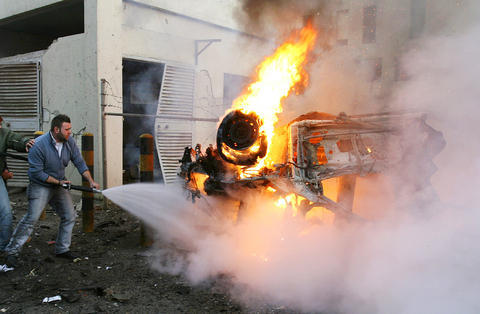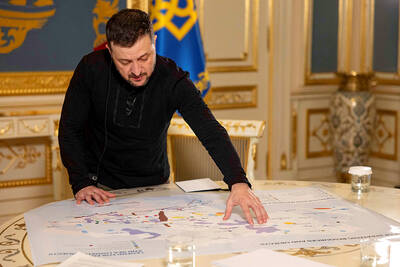Three people were killed on Tuesday by a bomb that targeted a US embassy car in the Lebanese capital, the latest in a string of attacks in the troubled country.
The bombing on a seafront road on the northern edge of Beirut came amid a deep political crisis in Lebanon and coincided with a Middle East tour by US President George W. Bush, who was in Saudi Arabia on Tuesday.
It also came amid heightened fears about security in light of an attack last week against UN forces in southern Lebanon and a threat against the army by a group believed to have ties to al-Qaeda.

PHOTO: AP
US Secretary of State Condoleezza Rice expressed outrage at what she called a terrorist attack.
Speaking in Riyadh, where she is accompanying Bush, she said Washington would not be deterred by "intimidation in its efforts to help democratic forces in Lebanon resist foreign interference in their affairs."
A senior Lebanese security official said the bomb was detonated as the US car was driving by along with another vehicle carrying civilians between the Dawra and Qarantina areas.
It was a 15kg bomb that we believe was placed in a car parked on the side of the road, the official said, adding that it was detonated by remote control.
Three people -- a Syrian on a motorbike and two other civilians in a passing car -- were killed and 26 wounded, he said.
In Washington, State Department spokesman Sean McCormack said officials at the scene were going through and continuing to do the investigation, collect information, collect evidence.
"So we don't yet have a full picture of exactly what happened, who is responsible, who is exactly being targeted," he said.
Asked if rumors were true that the embassy car had been part of a convoy involving the ambassador, he declined to talk about any facts that may get to operational security aspects of how we do business in Beirut."
In the wake of the attack, the US embassy said it had canceled a farewell reception for Ambassador Jeffrey Feltman.
Lebanese Youth Minister Ahmad Fatfat said the car had just dropped several US diplomats at Beirut airport and was apparently heading back to the embassy.
McCormack said a private US citizen was slightly hurt and was being treated in hospital. The Lebanese official said he was a minister at an evangelical church near the site of the blast.
The Lebanese driver of the car was also slightly hurt, while his only passenger, a Foreign Service employee, emerged unscathed.
Tuesday's attack was widely seen as a bid to derail Arab League efforts to bring an end to a festering crisis between the Western-backed government and Syrian-backed opposition over electing a new president.
Hezbollah Secretary-General Hassan Nasrallah said the Shiite opposition party "condemns any such attack on Lebanese territory, regardless of who is targeted."
Amal, the party headed by opposition leader and parliament speaker Nabih Berri, said the attack was aimed at torpedoing Arab League efforts to resolve the presidential crisis.
Arab League chief Amr Mussa was due in Lebanon yesterday in a new bid to try to resolve the deadlock ahead of a planned new vote in parliament on Monday to choose a successor to president Emile Lahoud, whose term ended in November.
Information Minister Ghazi Aridi said the best answer to such "terrorist" attacks, which "aim to destabilize the country's security and stability," would be to "adopt the Arab League plan.
That initiative is based on a three-point plan that calls for the election of army chief General Michel Sleiman as president, the formation of a national unity government in which no one party has veto power and the adoption of a new electoral law.

Thousands gathered across New Zealand yesterday to celebrate the signing of the country’s founding document and some called for an end to government policies that critics say erode the rights promised to the indigenous Maori population. As the sun rose on the dawn service at Waitangi where the Treaty of Waitangi was first signed between the British Crown and Maori chiefs in 1840, some community leaders called on the government to honor promises made 185 years ago. The call was repeated at peaceful rallies that drew several hundred people later in the day. “This government is attacking tangata whenua [indigenous people] on all

RIGHTS FEARS: A protester said Beijing would use the embassy to catch and send Hong Kongers to China, while a lawmaker said Chinese agents had threatened Britons Hundreds of demonstrators on Saturday protested at a site earmarked for Beijing’s controversial new embassy in London over human rights and security concerns. The new embassy — if approved by the British government — would be the “biggest Chinese embassy in Europe,” one lawmaker said earlier. Protester Iona Boswell, a 40-year-old social worker, said there was “no need for a mega embassy here” and that she believed it would be used to facilitate the “harassment of dissidents.” China has for several years been trying to relocate its embassy, currently in the British capital’s upmarket Marylebone district, to the sprawling historic site in the

‘IMPOSSIBLE’: The authors of the study, which was published in an environment journal, said that the findings appeared grim, but that honesty is necessary for change Holding long-term global warming to 2°C — the fallback target of the Paris climate accord — is now “impossible,” according to a new analysis published by leading scientists. Led by renowned climatologist James Hansen, the paper appears in the journal Environment: Science and Policy for Sustainable Development and concludes that Earth’s climate is more sensitive to rising greenhouse gas emissions than previously thought. Compounding the crisis, Hansen and colleagues argued, is a recent decline in sunlight-blocking aerosol pollution from the shipping industry, which had been mitigating some of the warming. An ambitious climate change scenario outlined by the UN’s climate

BACK TO BATTLE: North Korean soldiers have returned to the front lines in Russia’s Kursk region after earlier reports that Moscow had withdrawn them following heavy losses Ukrainian President Volodymyr Zelenskiy on Friday pored over a once-classified map of vast deposits of rare earths and other critical minerals as part of a push to appeal to US President Donald Trump’s penchant for a deal. The US president, whose administration is pressing for a rapid end to Ukraine’s war with Russia, on Monday said he wanted Ukraine to supply the US with rare earths and other minerals in return for financially supporting its war effort. “If we are talking about a deal, then let’s do a deal, we are only for it,” Zelenskiy said, emphasizing Ukraine’s need for security guarantees